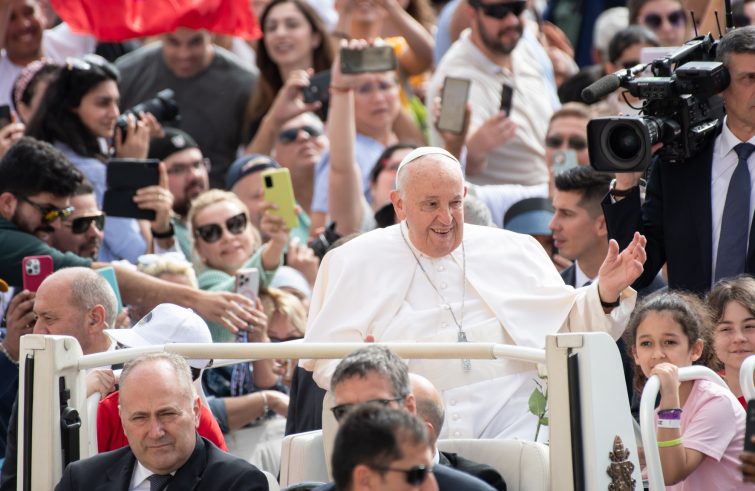
“The Holy Spirit makes harmony, harmony in life, harmony in the world”, Pope Francis said during the Wednesday general audience in Saint Peter’s square. The Holy Father began today a new cycle of catechesis centred on the theme: ‘The Holy Spirit and the Bride. The Holy Spirit guides God’s people towards Jesus our hope.” “We will not do ‘biblical archaeology”, the Pope remarked: “Instead, we will discover that what is given as a promise in the Old Testament has been fully realised in Christ.” Commenting on the first two verses of the Bible, Francis noted that “The Spirit of God appears to us here as the mysterious power that moves the world from its initial formless, deserted, and gloomy state to its ordered and harmonious state. the Spirit makes harmony, harmony in life, harmony in the world. In other words, it is He who makes the world pass from chaos to the cosmos, that is, from confusion to something beautiful and ordered. This, in fact, is the meaning of the Greek word kosmos, as well as the Latin word mundus, that is, something beautiful, something ordered, clean, harmonious, because the Spirit is harmony.” In the greetings in the various languages, the Pope quoted Card. Wyszyński, describing him as “the Primate of the millennium”, and St Paul VI, encouraging a second reading of Evangelii nuntiandi, still relevant today. At the end of the audience, after having offered his sympathy to the victims of the landslide in Papua New Guinea, the Pope made a
renewed appeal to “end the war”, which “is always cruel”
Citing his recent meeting with children in Ukraine, Francis said, “Children suffer so much in war: these boys and girls should start walking, moving with prostheses. They have lost their smiles. It is a very sad thing: it is very sad for a child to lose his smile.”
The Pope went on to quote the Epistle to the Romans, wherein St. Paul speaks of a universe that “groans and suffers as in labour pains” because of man “who has subjected it to the bondage of corruption”, the Pope commented in his catechesis: “this remains as true today as it was then.”
“We see the havoc that has been done, and that continues to be wrought upon creation by humanity, especially that part of it that has greater capacity to exploit its resources”, he denounced. The antidote, as St Francis teaches us in his Canticle of the Creatures, is “to put the joy of contemplating ahead of the joy of possessing. And no one has rejoiced in creatures more than Francis of Assisi, who did not want to possess any of them.”
“Our heart resembles that deserted, dark abyss of the first verses of Genesis. Opposed feelings and desires stir within it: those of the flesh and those of the spirit”,
the image conveyed in the final part of the catechesis. Giving it topical relevance, he added: “We are all, in a sense, that ‘kingdom divided against itself’ that Jesus talks about in the Gospel. Within ourselves we can say that
there is an external chaos – social choas, political chaos. We think about wars, we think about so many boys and girls who don’t have enough to heat, about so many social injustices. But there is also an internal chaos: internal to each of us.”
“The former cannot be healed unless we begin to heal the latter!”, is the Pope’s thesis. He concluded in unscripted remarks: “Let us do a good job of making our internal confusion a clarity of the Holy Spirit. It is the power of God that does this, and we open our hearts so that He can do it. May this reflection arouse in us the desire to experience the Creator Spirit. For more than a millennium, the Church has put on our lips the cry to ask: ‘Veni creator Spiritus! ‘Come, O Creator Spirit! Visit our minds. Fill with heavenly grace the hearts you have created.’ Let us ask the Holy Spirit to come to us and make us new persons, with the newness of the Spirit.”










